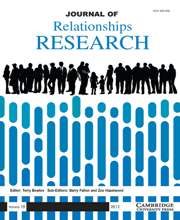Crossref Citations
This article has been cited by the following publications. This list is generated based on data provided by
Crossref.
Mcgregor, Leanne
Zimmer‐gembeck, Melanie J
and
Creed, Peter
2012.
Development and Initial Validation of the Children's Optimistic and Pessimistic Expectations of Relationships Scale.
Australian Psychologist,
Vol. 47,
Issue. 1,
p.
58.
Lev-Wiesel, Rachel
and
Sternberg, Rotem
2012.
Victimized at Home Revictimized by Peers: Domestic Child Abuse a Risk Factor for Social Rejection.
Child and Adolescent Social Work Journal,
Vol. 29,
Issue. 3,
p.
203.
Nesdale, Drew
and
Zimmer‐Gembeck, Melanie J.
2013.
The Handbook of Solitude.
p.
129.
Lev-Wiesel, Rachel
Sarid, Miriam
and
Sternberg, Rotem
2013.
Measuring Social Peer Rejection during Childhood: Development and Validation.
Journal of Aggression, Maltreatment & Trauma,
Vol. 22,
Issue. 5,
p.
482.
Zimmer‐Gembeck, Melanie J.
and
Nesdale, Drew
2013.
Anxious and Angry Rejection Sensitivity, Social Withdrawal, and Retribution in High and Low Ambiguous Situations.
Journal of Personality,
Vol. 81,
Issue. 1,
p.
29.
Zimmer-Gembeck, Melanie J.
Pronk, Rhiarne E.
Goodwin, Belinda
Mastro, Shawna
and
Crick, Nicki R.
2013.
Connected and Isolated Victims of Relational Aggression: Associations with Peer Group Status and Differences between Girls and Boys.
Sex Roles,
Vol. 68,
Issue. 5-6,
p.
363.
Zimmer-Gembeck, Melanie J.
Trevaskis, Sarah
Nesdale, Drew
and
Downey, Geraldine A.
2014.
Relational Victimization, Loneliness and Depressive Symptoms: Indirect Associations Via Self and Peer Reports of Rejection Sensitivity.
Journal of Youth and Adolescence,
Vol. 43,
Issue. 4,
p.
568.
Zimmer-Gembeck, Melanie J.
and
Duffy, Amanda L.
2014.
Heightened emotional sensitivity intensifies associations between relational aggression and victimization among girls but not boys: A longitudinal study.
Development and Psychopathology,
Vol. 26,
Issue. 3,
p.
661.
Zimmer‐gembeck, Melanie J.
Nesdale, Drew
Fersterer, Jade
and
Wilson, Jasmine
2014.
An experimental manipulation of rejection: Effects on children's attitudes and mood depend on rejection sensitivity and relationship history.
Australian Journal of Psychology,
Vol. 66,
Issue. 1,
p.
8.
Conn, Anne-Marie
Calais, Chante
Szilagyi, Moira
Baldwin, Constance
and
Jee, Sandra H.
2014.
Youth in out-of-home care: Relation of engagement in structured group activities with social and mental health measures.
Children and Youth Services Review,
Vol. 36,
Issue. ,
p.
201.
Rudolph, Julia
and
Zimmer‐gembeck, Melanie J.
2014.
Parent relationships and adolescents' depression and social anxiety: Indirect associations via emotional sensitivity to rejection threat.
Australian Journal of Psychology,
Vol. 66,
Issue. 2,
p.
110.
Croft, Carissa D.
and
Zimmer-Gembeck, Melanie J.
2014.
Friendship Conflict, Conflict Responses, and Instability.
The Journal of Early Adolescence,
Vol. 34,
Issue. 8,
p.
1094.
Ibrahim, Dara M.
Rohner, Ronald P.
Smith, Rhiannon L.
and
Flannery, Kaitlin M.
2015.
Adults’ Remembrances of Parental Acceptance–Rejection in Childhood Predict Current Rejection Sensitivity in Adulthood.
Family and Consumer Sciences Research Journal,
Vol. 44,
Issue. 1,
p.
51.
Rowe, Susan L.
Gembeck, Melanie J. Zimmer
Rudolph, Julia
and
Nesdale, Drew
2015.
A Longitudinal Study of Rejecting and Autonomy-Restrictive Parenting, Rejection Sensitivity, and Socioemotional Symptoms in Early Adolescents.
Journal of Abnormal Child Psychology,
Vol. 43,
Issue. 6,
p.
1107.
Erozkan, Atilgan
2015.
The Childhood Trauma and Late Adolescent Rejection Sensitivity.
The Anthropologist,
Vol. 19,
Issue. 2,
p.
413.
Egeli, Natasha A.
Rogers, W. Todd
Rinaldi, Christina M.
and
Cui, Ying
2015.
Exploring the Factor Structure of the Revised-Parent as a Social Context Questionnaire.
Parenting,
Vol. 15,
Issue. 4,
p.
269.
Zimmer-Gembeck, Melanie J.
2015.
Emotional sensitivity before and after coping with rejection: A longitudinal study.
Journal of Applied Developmental Psychology,
Vol. 41,
Issue. ,
p.
28.
Bungert, Melanie
Liebke, Lisa
Thome, Janine
Haeussler, Katrin
Bohus, Martin
and
Lis, Stefanie
2015.
Rejection sensitivity and symptom severity in patients with borderline personality disorder: effects of childhood maltreatment and self-esteem.
Borderline Personality Disorder and Emotion Dysregulation,
Vol. 2,
Issue. 1,
이영아
and
Inhyae Yi
2016.
The Relation Between Rejection Sensitivity and Social Anxiety in Male and Female Korean College Students: The Mediating Effects of Attentional Focusing and Moderating Effects of Attentional Shifting.
Korean Journal of Health Psychology,
Vol. 21,
Issue. 3,
p.
641.
CHISHIMA, YUTA
and
MURAKAMI, TATSUYA
2016.
Relation Between Acceptance of Kyara in Friendship and Psychological Adjustment :.
The Japanese Journal of Educational Psychology,
Vol. 64,
Issue. 1,
p.
1.




